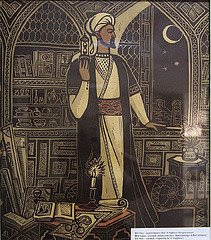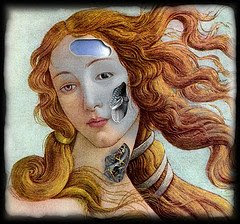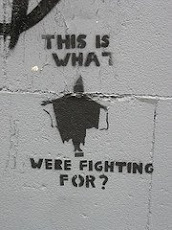Watch the following video clip from Bride of Frankenstein on Youtube:
http://www.youtube.com/watch?v=CiFfUnimUH4
"Own Story"
In groups of 2-3 discuss the following questions, afterwards share your answers with the class:
- Do you think Dr.Frankenstein had the right to create the monster and then the monster's bride?
- With so much knowledge about how to change and control the natural world, do you think science graduates have enough social and ethical skills to responsibly use their know-how?
- Do you think it is the responsibility of scientists to report unethical practices and dangers to public safety to the media?
- In your opinion what are the characteristics of a truly great scientist?
- Should scientists be involved in politics and social organisation?
Reading Comprehension
The following extracts come from the article 'Scientific revolutions and moral revaluations' by the French physicist Gerard Toulouse.
Instructions
This is an information exchange exercise. The class is divided into three groups. Each one is responsible for reading one of the extracts below.
Afterwards, they answer questions related to their text. Each group has a copy of the other groups’ questions.
Once the texts are read and the questions completed, the answers are shared in a seminar. Students must listen, take notes and ask if they don’t understand.
Extract 1
...during the last eight decades, growing waves of concern about the connections between science and war, about the health of our planet, and about the manipulation of life processes have convinced most people that serious reflection and action was due. Around the turn of the millenium, it became accepted practice that any novel important research program should include an ELSA component (Ethical, Legal and Social Aspects of Science).
For many years, a set of practical questions have persistently haunted me : At which conditions, can a student embrace a career in scientific research, without becoming or turning into a public hazard ? What share of his/her time and efforts should be devoted to ethics-related reflection, and what background formation should he/she be offered ? Which initiatives, within teaching and research institutions, could help and nurture a proper environment ? " Science as salvation " was part of my youth dream ; to what extent, and how, can such a dream be sustained, honestly, nowadays ?
***
Extract 2
Knowledge brings responsibility, because knowledge is (a form of) power, and power brings responsibility. Scientists have a duty of alert, because they are best placed to alert society to the possibly harmful consequences of their activities, discoveries and inventions ; they have competence, and capacity for early warning. Scientists have a continuing responsibility, because the outcome of scientific research (its direct and indirect consequences) is at least partly unpredictable ; this continuing responsibility implies a duty of discernment and vigilance, sustained on the long term.
In his Nobel lecture, Jo Rotblat said : Whistleblowing should become part of the scientific ethos. The life of Albert Einstein provides an illustration of scientific whistleblowing : duty of alert (his four letters to Roosevelt, from 1939 to 1945), continuing responsibility (his last signature was for the Russell-Einstein manifesto, which thus acquired the symbolic value of a testament). Encouraged by the example of Einstein (and his readings of Albert Schweitzer, Leo Szilard, Linus Pauling, Niels Bohr), Andrei Sakharov has given a model of personal moral revaluation, unique in its amplitude and subsequent worldwide impact ; in his words : Every true scientist should undoubtedly muster sufficient courage and integrity to resist the temptation and the habit of conformity.
Extract 3
"I am convinced that science departments with a broad scope, integrating also societal concerns and questions of global relevance in their courses and daily discussions will succeed in overcoming the present difficulties of recruiting students. (…) I have to admit that I myself would prefer, if I had to start again, a study that combines top science with societal concerns and global vision, rather than detached, stand-alone science, even if the latter would be taught by the most knowledgeable international specialists. (…) Who else, if not the scientists, is responsible for setting guidelines for defining progress and for protecting the interests of future generations ?
Richard Ernst, Noble Laureat, 1991 cited in Toulouse(2006)
Questions for Extract 1
-Vocabulary
From the context try to work out the meaning of the following words; if you can't use a dictionary - Merriam-Websters- Online Dictionary:
hazard, novel, sustained
a) Why is ethical reflection important now?
b) What is ELSA?
c) As a science teacher what was Gerard Toulouse's persistent worry in relation to his students?
d)What was Toulouse's vision for science, and why does he doubt it can be realised?
e)What title or subheading would you give this extract?
Questions for Extract 2
-Vocabulary
From the context try to work out the meaning of the following words; if you can't use a dictionary - Merriam-Websters- Online Dictionary:
duty, harmful, sustained, whistleblowing, muster, habit
a)Why should knowledge engender responsibility?
b)Why should the responsibility of blowing the whistle on unethical practices in science fall on scientists?
c) According to Andrei Sarkharov scientists habitually refuse to take ethical responsibility for their research because they:
i) are frightened of rocking the boat.
ii)have no social conscience.
iii) are only interested in the results of their research and this overrides risks to public safety.
iv)concerned that they will stand out.
d)What title or subheading would you give this extract?
Questions for Extract 3
-Vocabulary
From the context try to work out the meaning of the following words; if you can't use a dictionary - Merriam-Websters- Online Dictionary:
overcoming, broad scope, guidelines
b)What kind of science course would Richard Ernst liked to have studied when he was a student? c)As a student who would Ernst have preferred to have as a guest teacher: a famous physicist or a local lecturer in sociology?
d) Who, according to Ernst, in society should be responsible for providing the standards for success and safety in society?
e)What title or subheading would you give this extract?
"Critique"
What aspects of these extracts do you agree or disagree with? Express your opinions backing them up with reasons.
*PHELMA students responses and Prof. Gerard Toulouse's comments
"Evaluation"
Without talking to your neighbour write a few words describing what you have learnt; in other words, have your opinons changed or have they been confirmed? Submit your comment as comment to this post.
References
Gerard Toulouse (2006) - 'Scientific revolutions and moral revaluations'
- All extracts used with permission from Gerard Toulouse.
© All copyright. Ray Genet 2008 - revised August 2009







+II+-+socialist+art+by+night+_eulen.jpg)









7 comments:
ABOUT THE ETHICAL EDUCATION OF THE SCIENTIST:
I think an ethical question is always about an action. Than future scientists shall be first educated to understand the consequences of their actions, and only afterwords to ethic. What social impact shall I expect from a new technology? What can history teach us about that? To what point is it possible to make a prevision? We should answer to these questions, in order to know what we really are doing in the social context. Only then a scientist can really be aware of his power, and than able to see his responsibility.
Mattia Perozzi
I think that the scientists must have basics on ethics, for example not to use cloning in their researchs. And when they discover something, they shall describe some ethics aspects of their results.
But they can just alert the people, because they can not control how their results will be used. Hence they have a limited power and ethics is not the social responsability of scientists but the social responsability of everyone, especially the one of the people who have great responsibilities.
I believe scientific courses in the university are not always sufficient in order to prepare a student to a career as a researcher. Learning ethics and some chapters in social sciences are as important as pure scientific matters. A brilliant student in his scientific classes won't necessarily have the tools during his career to understand the true implications of his work. For instance, courses in genetics must be implemented by proper philosophical debates.
I agree with Gerard Toulouse when he says that knowledge is power, and that it brings responsibility. However, power is not the issue, the real problem arises from the way we harness it. It is not only scientists that should be concerned with ethical, legal and social aspects of science, but everybody taking decisions, and even voting. Coming to a consensus on ethical matters will be extremely difficult, if not impossible.
Who else, if not the scientists, is responsible for setting guidelines for defining progress and for protecting the interests of future generations ?
So scientists should take charge of what is done with their creations in addition to the progress of mankind? It is an easy way to find responsibles. But it would'nt erase the problems and could bridle research too much. Worst it suggests that scientists, or science -or both- are all-powerfull. This is self blindness. Everyone has to take his responsibilities in collaboration with responsible scientists.
All the above comments are to be considered. But in the actual world we are living in, isn't it already too late changing the way science is taught? Many people are making money on others behalf while people are starving around the world. Monsanto is having a lot of money because of his monopole. This company has surely the best of scientists and for sure they are really good at developing their stuff but they are also forcing people to use their products. So the question is, in what way and to what extent am I going to be harmful to my planet? At which level of education should ethics be taught and how?
From my point of view, scientists and engineers have a great power on the society, it has been changed several times by great discoveries, for instance cars changed the face of the earth and influenced other fields of society like the industry, computer created a new economy; obviously the atomic bomb,that comes from one of the biggest physics discovery, upset internationals relationships.
Thus it is clear that scientists have a real power even if I have
the impression that they aren't seen this way. And more and more scientists have to watch out
not only their invention but also how they are used, they have to foresee and anticipate their
consequences. So they have the power and the duty to alert firstly because they have the information and secondly because they are seen by the society as unbiased (unlikely to politics).
In order to assess the aftermaths, they must take a societal point of view.
So lessons about ethics in scientific universities could really bring this subject in the mind of every scientist to be. When we see the growing influence of technologies and industry and the velocity of evolution, in the future scientists will have to be vigilant.
In my mind, the "salvation" will come from an awareness of everybody on scientific facts : scientific figures about global warming always alert people.So ethics in science has really a role to play in we want reach
this "salvation".
Post a Comment